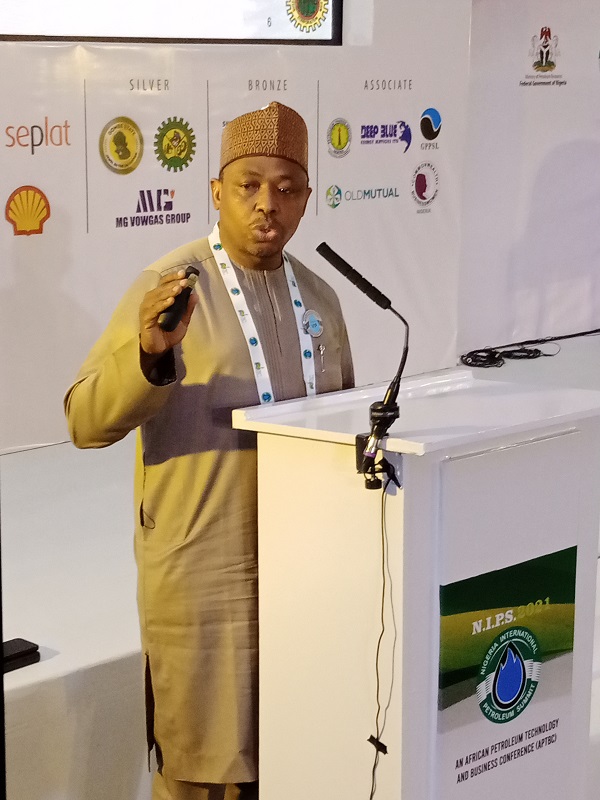Engr. Yusuf Usman, COO, NNPC Gas and Power
-By Felix Douglas
…Gas is a destination point and transition fuel.
…NGEP Promotes use of LPG, CNG and enhancement of auto gas policy with 11.5 million vehicles
The Centre for Petroleum Information (CPI), is one of the revered oil and gas association creating value through knowledge with trends concerning the energy sector. It has array of industry professionals who often give their perspectives on pertinent issues with regards to the sector.
There had been discussions towards energy transition. What does energy transition means? Naturally, when the world is going through a particular direction like a moving train, if any country lingers, it will be left behind. This has been the problem with Africa and any time the world actuates towards a direction, the continent dwadles.
Speaking at CPI Petroleum Policy Round table (PPR XXI) event via webinar to discuss energy transition and how prepared is Nigeria towards future transformation, the Chief Operating Officer (COO) Gas and Power of the Nigerian National Petroleum Corporation (NNPC), Engineer Yusuf Usman, debunked insinutations that the government gives lackadaisical approach to energy transition.
According to Engr. Usman, the current movement is energy transition but how does the continent joins the rest of the world? If development is not taken seriously, there might be issues. The continent is energy efficient but can it catch up in future to use some of the mix to attain development and exceed its desired level?
Can energy mix be produced to a destination point? He explained vividly that there has been policies in Nigeria to meet its objectives around utilization of gas as an energy source to the extent that President Mohammadu Buhari made a pronouncement that 2021 is a decade of gas with an action plan.
Sustainable Development
There are three elements for sustainable development: economy, environment and social aspects which the government considers.
Engr. Usman submitted that gas will be a succour for the country in its energy transition drive because of its connection. “If we promote the use of gas that will lead to development since the country has the energy mix. If gas can be used, the country has achieved a success in terms of development.”
Nigeria has huge gas but only minuscule amount of it is used in the country.
The NNPC COO said the country has made viable decisions using gas as a destination point. Gas is an energy mix used for food and fertilizer to enhance farming.
In its policy towards energy transition, Engr. Usman revealed that the government through Ministry of Petroleum Resources has set up Nigerian Gas Expansion Programme (NGEP) which is to promote the use of Liquefied Petroleum Gas (LPG) through mass distribution centers.
This decision is taken by government because it has a challenge with Premium Motor Spirit (PMS) as prices fluctuates making it difficult for Nigerians to afford hence there is need to focus on energy that is relatively cheap. This is why NGEP promotes the use of gas.
Aggressively, government is also enhancing use of auto gas. The first initial years will be propelled by government through acquistion of conversions that will encourage vehicles to convert to auto gas and infrastructure that will collocate the process in filling stations for more inclusions. Since Nigeria has abundant gas, it plans to convert 11.5 million vehicles.
Apart from LPG, government is promoting Compressed Natural Gas (CNG) to collocate with PMS stations, although it requires dedication and commitment with huge cost implication.
Engr. Usman asserted that gas pipeline infrastructure is concentrated in the southern part of Nigeria to enhance use of CNG and only half of the country will be covered but the vision of the government is to make assidous efforts to transcend the country. Fortunately, Nigeria has a substantial quantity of Liquefied Natural Gas (LNG).
Energy hub will be created in order to give access to CNG in nooks and cranies across the country. Conversion of vehicles to CNG will be free and importation of converted vehicles will be consolidated. This policy is in place with actionable plan to make it achievable.
Gas will enable the country to reduce carbon emission and create alternative clean energy by conserving huge fund used for subsidising PMS with significant revenue to government.
To show its commitment towards energy transition, Engr. Usman said the government has flagged off and built two LPG stations in Abuja with gas hubs. The next phase will be to put natural gas scheme to penetrate the country. CNG and LPG are available, affordable and flexible.
Challenges
Engr. Usman stated that the initiative requires investment and NNPC is driving the process with support from government. The corporation is collaborating with some marketers and stakeholders to participate in effective sales.
Right pricing is key so as to arrive at a price lower than PMS to encourage usage.
Pipeline infrastructure is expensive and it requires money which is another aspect of consideration.
Notwithstanding, Nigeria has taken its energy transition journey to renewable and it will use gas as a destination fuel to actualise the process. NNPC and the Ministry of Petroleum Resources are promoting use of auto gas as a transition fuel.


Comment here